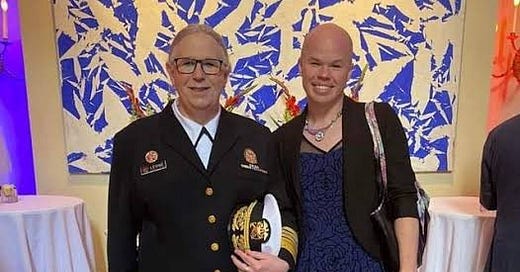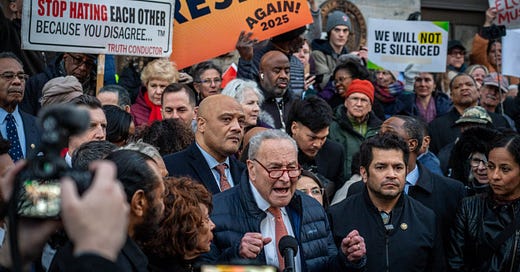
Remarks in Providence
This nation faces a terrible, paradoxical challenge.
We are now called on to defend the American way of life against a furtive, resourceful enemy. But how much of what we are called on to defend is actually worth defending?
Events now require us to become very clear in our individual minds, and our collective imagination, about what we mean when we use that phrase the American way of life.
We have a lot to sort out. We tend to lump together a lot of American traditions, practices, habits, laws, and institutions into one easily consumable package called our way of life. It’s a little like taking the contents of your refrigerator, dumping them all arbitrarily in a casserole dish, and calling it a “recipe” – the half eaten can of tuna with the orange marmalade and the liverwurst and last night’s tortellini. . . you get the picture.
I’d start by making some distinctions.
I’d make a distinction, for instance, between the American institution known as due process of law, and the half-century-long practice of suburban land development. We can continue being a great American nation without developing more cul-de-sac subdivisions and strip malls, but not without due process of law.
I’d make another distinction between our tradition of personal liberty and the half-century habit of driving cars whenever we feel like it, based on the historical anomaly of cheap and plentiful gas. We can continue being a great American nation without being in our cars all day long, but not without the liberty to choose our careers, our friends, and our thoughts.
I’d make another distinction between our constitutional right to free speech and the currently-fashionable (but false) notion among so-called property rights advocates that land ownership in the USA never entailed any duties, obligations, or responsibilities to the public interest.
We have to sort a lot of these things out. What does the American Way of Life really stand for? Because there are some elements of American way of life these days which are not necessarily worth defending, and we had better know the difference.
I was very impressed a few weeks ago – after the airplane attacks of Sept 11th – when I traveled to Texas and was reminded how life is lived in much of the American heartland these days. I went to Arlington, halfway between Dallas and Fort Worth, a wasteland of freeway ramps, sodium vapor lamps, tilt-up pawn shops, Darth Vadar-style office cubes, fried meat sheds, and free parking. It was, of course, accessorized by what we call “housing” – that is clumps of luxury villas and poverty bungalows and in between ranch houses (without ranches), all disaggregated from each other and from the normal infrastructure of daily living.
While I was there, a grim thought dogged me: American soldiers will now be called on to spill their blood halfway around the world for places like this. Some of them may do it gladly without thinking twice. But what about the ones who try to ask themselves what they are making the supreme sacrifice for? Some of them are going to come up with a mental image of those off-ramps and parking lot wastelands back home in places like Arlington, Texas, and they are going to meet their deaths in despair and cynicism when that happens. And another tragic part of this is that there is nothing we can do about that now. Those places are what they are – places not worth caring about. We have to live with the consequences. One of which is that places not worth caring about may make us a nation that few will wish to defend.
I had to deliver a very unhappy, unwanted message to the Arlington, Texas, Chamber of Commerce. I had to tell them that we are entering a time when places like theirs are liable to dry up and blow away unless they take immediate steps to begin changing the character and the physical organization of where they live. They didn’t want to hear it, and many of them are not going to think about it, and they told me so.
There will be many consequences of the September 11th attacks, but the chief one is this: we are now compelled to change the American way of life. Circumstances require it now, immediately, without delay, whether we like it or not – and that’s just the way it is.
America spent the 1990s sleepwalking into the future and now it is here with a very unappetizing menu of events for us: terrorism, war, the disruption of a global economy that turned out to not be a permanent institution, and many other scary things.
The new circumstances of our world require us to condense American life back into towns, neighborhoods, villages, and cities. The suburban sprawl experiment is about to end – and by the way, it is going to end in an orgy of default, repossession, devaluation, loss, and economic strife, not with a whimper but with a loud, plangent cry.
The suburban sprawl experiment is going to end because eighty percent of the remaining world oil reserves lie between the Arabian Peninsula and the South China Sea and are under the control of people who don’t like America. And behind that unhappy situation is the deeper problem that world oil production is a few years away from peak, and that after that we will enter an era of chronically unstable oil markets, no matter what else happened.
We should be clear in our minds that no technological innovations are going to alter this picture. Fuel cells, electric cars, solar power, hydrogen – these things remain fantasies at the mass user level.
So we are compelled now by events to begin transforming our living arrangements – not tomorrow, not two weeks from today, but now – because that is the one thing we absolutely know we can accomplish.
The National Trust has stood shoulder to shoulder with the New Urbanists on these issues for ten years. But now the National Trust is going to have to become even more activist. The National Trust has to get the message out, institutionally, that America can’t afford another week of complacency. The National Trust has got to state the message clearly that the American way of life is not about driving around eating hamburgers. The National Trust has to declare that living the way we have gotten used to living is a menace to our national future. And the National Trust has, above all, got to inform the American public, with conviction and confidence, that there is a better way.
Circumstances are telling us pretty clearly that we will need to reorganize American life into forms that are far less dependent on imported oil. The most realistic method for achieving this for Americans to live in traditional walkable communities, authentic towns, cities, neighborhoods and villages.
This is what the New Urbanist movement had been all about. Ten years ago a group of young, energetic men and women had a vision of a future America that would necessarily have to be re-condensed into environments that made economic sense, that had the ability to endure through time, and that were spiritually rewarding enough to be worth caring about.
One of the secrets of the New Urbanism is that it was not new at all. It was the old urbanism resumed after a sixty year interruption during which we tried an experiment in human ecology – the Drive-in Utopia – which has now volved and matured into our National Automobile Slum. An experiment that has failed.
The New Urbanism was a return to tradition, a return to successful precedent, a return to patterns of human existence and human ecologies that had a proven record of success: neighborhoods, towns, villages and cities. Integral human communities composed of places to live and work and a public realm that supported the project of a civilized exisitence. Places that do not require the mandatory use of cars or compulsory commuting.
This is the one thing we absolutely know that we can do in the face of our new and compelling circumstances.
We don’t know yet whether we can conduct a successful “war on terrorism.” I hope we can, but it remains to be seen. We don’t know yet how many of the one billion Muslims in the world want to go along with a jihad against America, or more generally the West. We really don’t know. It’s been fashionable in America for quite a while to pretend that all the cultures of the world desire to be friends, as if the world was one big progressive kindergarten, but we’re finding out the hard way that that’s just not true.
We don’t know whether there is an adequate energy replacement for fossil fuels. We hope so, but it is far from being demonstrated.
We do know how to construct a living arrangement that makes sense, a living arrangement that has a future. We do know how to make neighborhoods, towns, villages, and cities. And we’re going to need them. So we have to get started on that project right away.
The National Trust has got to make this a patriotic campaign, every bit as important as the Interstate Highway Project was to our parents and grandparents’ generations.
We have in America cities, towns, villages, and neighborhoods that are waiting to be reinhabited, including Providence, Rhode Island. We may go through some hard times ahead. Money may be shorter than it was back in the great boom of the past decade. But we’ll get over that. It may be good for us. It may prompt us to return to some fundamentals, like the simple truth that there is more pleasure in the company of real human beings than in all the TV characters ever videotaped. That when families eat meals together, they get to know each other. That a real community is a better place than cyberspace. That the authentic is fundamentally better and more necessary than the virtual.
So, it’s time to be galvanized by a great idea whose time has come: that Americans need to live in a better everyday world than the national automobile slum.
The reconstruction of American places worth caring about and worth defending requires a new consensus that we are capable of making a better everyday world to live and work in than the national automobile slum.
I urge you to join us on the front lines of this struggle.
Cheers, blessings, and good luck!










